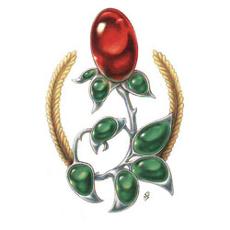Chauntea

| |
| Chauntea | |
|---|---|
| Titles | Bhalla, Chantea, The Grain Goddess, The Great Mother, Jannath, Pahluruk |
| Symbol | Blooming rose on a wreath of golden grain |
| Home Plane | Greenfields |
| Alignment | Lawful neutral |
| Portfolio | Agriculture, Crops, Farmers, Gardeners, Summer |
| Worshipers | Philosophers, sages, sorcerers, wizards. |
| Domains | Animal, Good, Earth, Plant, Protection |
| Favored Weapon | Scythe |

|
Neverwinter Nights 2 Wiki Visit related material |

|
Forgotten Realms Wiki Visit related material. |
Chauntea (pronounced Chawn-TEE-ah), the Grain Goddess or the Great Mother is the goddess of life and a parallel deity to Silvanus, who was considered the god of wild nature, whilst Chauntea herself was seen as being the embodiment of all things agrarian or agriculture. She was a goddess of agriculture, plants cultivated by humans, farmers, gardeners, and summer.
Dogma
The church outlined a general set of precepts and forbiddances, though some of these were given to subjective interpretation, since the faith was individualistic. Chaunteans saw wanton destruction as antithetical to the cycle of life. They were urged to nourish at least one living thing every day of their lives. They were advised to eschew fire also.
Clergy and Temples
The church was an approachable one, in that it welcomed all irrespective of gender or race. The liturgical doctrine of the church was such that it attracted more females than males, due to its preoccupation with femininity, and while female attendees outnumbered men, there was still a range of males that worshipped Chauntea.
Clerics prayed for their spells at sundown, as did druids. They usually led dual lives as either gardeners or farmers, and were industrious people. They were expected to appreciate natural beauty and possess a feeling for meditation. The clergy instructed Chauntea's followers that they should make entreaties every sunrise. Compared to other faiths, ecclesiastics appointed few holidays. One holiday which was observed was a festival during Greengrass, which was a festival bordering on depravity and indulgence, where excessive consumption and uninhibited behavior was encouraged. Abundance was an important part of life worshiping the Great Mother. A rite of passage for many of the faith was concerned with Holy Communion. Newly married couples were instructed to spend their first night in fresh fields, supposedly to guarantee a fertile marriage.
| Deities | |
|---|---|
| Overgods | |
| Major | |
| Minor | |
| Drow | |
| Dwarven | |
| Elven | |
| Gnomish | |
| Halfling | |
| Mulhorandi | |
| Orcish | |